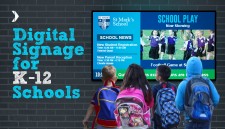
Mvix, a leader in affordable cloud-based digital signage solutions, today released a whitepaper that takes an in-depth look at how digital signage is being used in the K-12 ecosystem.
Sterling, VA, May 19, 2016 (Newswire.com) - The free download “Digital Signage for K-12 Schools” begins by exploring the student-teacher dynamic, why this relationship is suffering, and why technology is the lubricant that’ll reduce the friction between both worlds. Today’s students, aptly dubbed “digital natives,” grew up in a digital world and are used to constant stimulation and instant gratification. According to the whitepaper, their entire existence is wrapped up in digital devices; from television, mobile, and video games to the Internet and social media.
The whitepaper has some interesting data, reporting that digital natives have spent less than 5,000 hours of their lives reading but more than 20,000 hours playing video games and 10,000 hours watching television.
The ROI of digital signage in K-12 schools is arguably the best compared to other industries. This whitepaper will help school admins realize the potential of digital signage in their schools and understand how to properly leverage it.
Mike Kilian, Director of Business Development
Teachers on the other hand, are not as accepting of the technology:
Where digital natives take an “out with the old, in with the new” approach to technology, educators aren’t as quick to abandon once-proven methods, even when they’ve proven to be outdated.
The whitepaper suggests that digital signage can bridge this gap between tech-savvy students and “old school” educators. It rolls technologies of computers, projectors and interactive whiteboards into one compact, easy-to-use system, providing a level of versatility unseen with previous technologies.
From the paper:
Digital signage provides students with an engaging and entirely interactive experience. When used as an instructional tool, the benefits are:
Screen sharing makes for efficient student/teacher collaboration, and collaboration is no longer dependent on student/teacher location (great for a crowded classroom, or distance learning).
Collaborative learning modules not only provide an interactive experience for the student, but real-time feedback for the teacher. Students can ask questions, and teachers can look in on students anonymously to gauge understanding and adjust the lesson plan or provide individual attention as needed.
Teaching resources and district policies are accessible at the click of a button and can be created, edited, distributed, maintained and managed as needed.
Presentations can be enhanced using animated text and images and/or web-sourced content, such as high quality video.
Teachers can give students on-screen recognition for a job well done, providing students with an incentive to excel.
The need for printing and photocopying are all but eliminated, saving educators substantial time and money.
The whitepaper also looked at how digital signage is being used outside the classroom, specifically for emergency messaging and in cafeterias to encourage healthy eating habits. More and more schools are leveraging the vibrant simulations and imagery to draw the students’ attention to messages about healthy food choices. The menu boards are also being used to direct traffic during lunch -- lines are moving faster and kids are getting more time to eat.
Now that digital signage can be CAP compliant, schools are adding the technology to their emergency notification systems. The technology can display CAP alerts from local and national sources, as well as custom alerts for events such as school closings and gas leaks.
"The ROI of digital signage in K-12 schools is arguably the best compared to other industries," said Mike Kilian, Mvix’s Director of Business Development. "This whitepaper will help school admins realize the potential of digital signage in their schools and understand how to properly leverage it."
This new thought leadership paper can be downloaded or read online at, Digital Signage for K-12 Schools.
Source: Mvix
Share:
